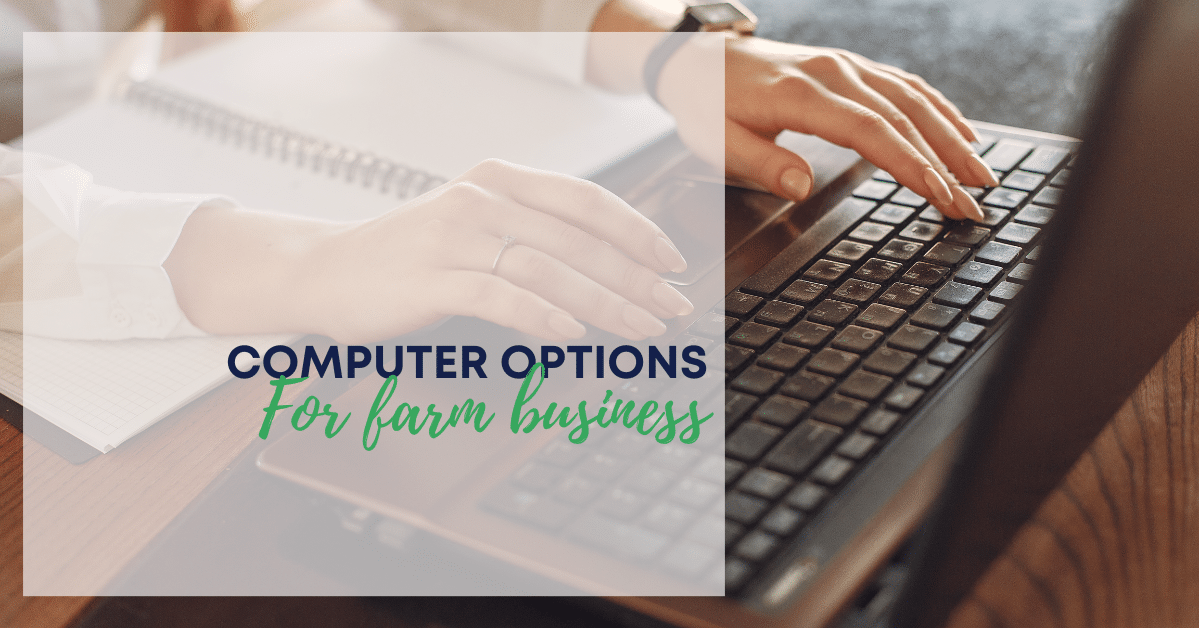
Looking to upgrade or improve your farm business computer?
What are the alternatives and what do you need to think about? Everyone has there own preferences, but let’s run through a few options. I am not going to talk gigabytes and ram, mostly because I don’t understand them and also because the data and speed requirements of most bookkeeping and business management functions we do day to day don’t need a lot of horsepower. If you want some professional advice on this, it can be handy to make a list of the programs, apps and functions you use regularly when you go to purchase
Main Desktop Computer – If you have a permanent office spot and don’t travel much, a desktop based system works really well. The general rule is that if a desktop PC and a laptop have the same specifications, the laptop will be more expensive, so desktops offer good value for money. Desktops, because they are stationary, tend to have a longer lifespan than your average laptop, at least they do in our high impact household. The large towers of the past have made way for small units, about the size of a paperback novel. Upgrading your computer when the time comes may only involve upgrading this small unit, existing monitors, keyboard and other peripheries can be retained.
Laptop as main computer – If you travel for work or pleasure or are also studying, a laptop is an excellent choice as your main computer. Portable and in most cases sufficiently powerful for the business admin or data recording required by the average farm business. Ergonomically they are compromised, with the screen and keyboard both too small and in a fixed position. Even a short period working on a laptop can result in a sore neck, back or wrists. A docking station can be used to easily connect a laptop to a set of screens, an external mouse and a full sized keyboard with only one cord. The downside of the laptop as the main computer is that if this is the only computer for the family/business, when you have it on the road, the rest of the family have nothing. The other downside is fragility. With a higher likelihood of damage and destruction, you may be left with nothing until the laptop can be fixed or replaced.


Laptop as secondary computer – A great option for those who travel. It gives you great potential to work in town if waiting for a vehicle service etc. It leaves the main computer in the home, both to service others and to allow for a quick exit with the laptop remaining packed and ready to go. Using a cloud hard drive (like google drive or drop box) as well as a password management system (like Dashlane or LastPass) you can seamlessly swap from one device to the other. Having the laptop as a second computer is a great risk management strategy, especially if you are also using a laptop in the shed, paddock or yards for data recording where it could easily get broken or left behind. Or if your teenager breaks their school laptop again, you have a spare.

Second screens or super big curved monitors
Not just the domain of hard-core gamers and stock brokers, using dual monitors or big wrap around monitors has a place in every farm office.
You can search for things online, (like your bank statements or an invoice) on one screen and enter data into your bookkeeping or crop record keeping or spreadsheet program etc on the other. You can keep an eye on emails on one screen while you have the main project for the day on the other. Your mouse scrolls from one screen to the other as if they were one screen.
In our online excel course and some participants are running the videos on one screen and working through the tips on another.
This link has some excellent tips on how to set it up. It’s not hard, I managed to bumble my way through.
You can pick up second hand monitors quite cheaply from buy swap sell etc or your local computer shop may also have one. Take a picture of the back of your computer terminal and they can tell you if the plugs are the same as you may need an adapter for some older monitors or computers. The monitor does not have to be flash, my public servant brother-in-law gave me one from the bin at his work!

Wireless or Wired?
Some people hate wires, they look untidy and we all hate when the mice use them as rigging so they can leave their little messages (my mother-in-laws’s euphemism for mouse shit), in the most unlikely places. However if you are always running short of batteries and have little kids that pick stuff up and walk around with it, sometimes it’s best to have things tied down and use a wired alternative. Surprisingly, cable ties, which are used for almost everything else on farm, can also be used to tidy cables away. If you are an enthusiastic plugger in of things, these little USB banks are handy.

A word about over capitalisation
As an industry, agricultural businesses are typically overcapitalised. If you’re not holding back in the paddock, why hold back in the office? Remember, this is important work.
Share the love
[Sassy_Social_Share]

